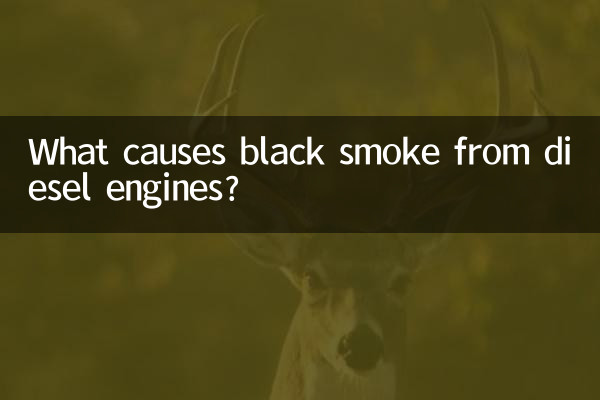What causes black smoke from diesel engines?
Black smoke from a diesel engine is a common fault phenomenon and usually indicates insufficient combustion or system abnormalities. The following uses structured data and analysis to summarize the causes and solutions to the diesel engine black smoke problem that have been hotly discussed on the Internet in the past 10 days.
1. Common causes of black smoke from diesel engines

| Cause classification | Specific performance | Repair suggestions |
|---|---|---|
| fuel system problems | Clogging of fuel injectors, poor fuel quality, and incorrect injection timing | Clean or replace the fuel injector, use qualified diesel, and adjust the injection time |
| Air intake system blocked | Dirty air filter, turbocharger failure | Replace the air filter and check whether the supercharger is leaking or damaged |
| Combustion chamber problem | Insufficient cylinder pressure and worn piston rings | Inspect cylinder sealing and replace piston rings or cylinder liners |
| ECU or sensor failure | Oxygen sensor failure, ECU data abnormality | Use a diagnostic tool to read the fault code, replace the sensor or refresh the program |
2. Popular discussion cases in the past 10 days
| Case source | Problem description | solution |
|---|---|---|
| A truck forum | The National VI diesel engine emits black smoke when accelerating, accompanied by a decrease in power | DPF (particle trap) clogged, fault disappeared after regeneration |
| Agricultural machinery short video platform | Old tractor produces heavy black smoke during cold start | Replace the engine oil with appropriate viscosity and preheat it before working |
| Car repair question and answer platform | Black smoke still comes out after calibrating the pump, and fuel consumption increases | It was found that the high-pressure oil pump plunger was worn and returned to normal after replacement. |
3. The five issues that users are most concerned about
1.Why are National VI diesel vehicles more likely to emit black smoke?
Due to the upgrade of emission standards, failure of the after-treatment system (such as DPF, SCR) will directly lead to black smoke and requires regular maintenance.
2.Does black smoke require immediate repair?
It may just be insufficient combustion in the short term, but it will damage the three-way catalytic converter in the long term. It is recommended to check it as soon as possible.
3.Can adding fuel oil to diesel fuel solve the problem?
Inferior additives may aggravate carbon deposits, so mechanical components should be inspected first.
4.Is it normal for black smoke to increase in winter?
It is normal for combustion efficiency to decrease at low temperatures, but if smoke continues, the preheating system needs to be checked.
5.How much does the repair cost approximately?
Ordinary injector cleaning costs about 200-500 yuan, while replacing a turbocharger costs more than 3,000 yuan.
4. 4 suggestions to prevent black smoke from diesel engines
1. Regularly replace the air filter and diesel filter element (recommended every 10,000 kilometers);
2. Use low-sulfur diesel fuel that meets standards;
3. Avoid long-term low-speed and heavy-load operations;
4. Clean the EGR valve and intake pipe every 2 years.
From the above analysis, it can be seen that the black smoke emitted by a diesel engine needs to be comprehensively judged based on specific phenomena. Timely maintenance can not only reduce emission pollution, but also extend engine life.

check the details

check the details